What If Your Next Beverage Wasn't A Liquid?
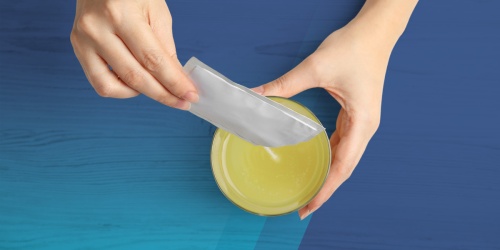
While you might associate beverages with liquids, another type of beverage has emerged and grown in recent years — ready-to-mix (RTM) beverages.
The thirst for convenience is growing. Our on-the-go lives have influenced our beverage choices, and they also influence the beverage "formats" we prefer. As consumers become increasingly health-conscious and seek convenient solutions for their nutritional needs, RTM supplements are emerging as an innovative alternative to traditional liquid beverages. These powdered supplements offer a blend of health benefits, ease of use and portability that aligns perfectly with modern lifestyles.
To delve deeper into the formulation and manufacturing challenges of ready-to-mix beverages, we turned to VitaQuest, a leading innovator and manufacturer of powder supplements for more than 45 years. VitaQuest's extensive experience in developing high-quality, effective products places them at the forefront of RTM innovation. We spoke with Lauren Samot, VitaQuest's Commercial Innovation Leader, to gain insights into the unique challenges and opportunities of RTMs.
What Is a Ready-to-Mix Beverage?
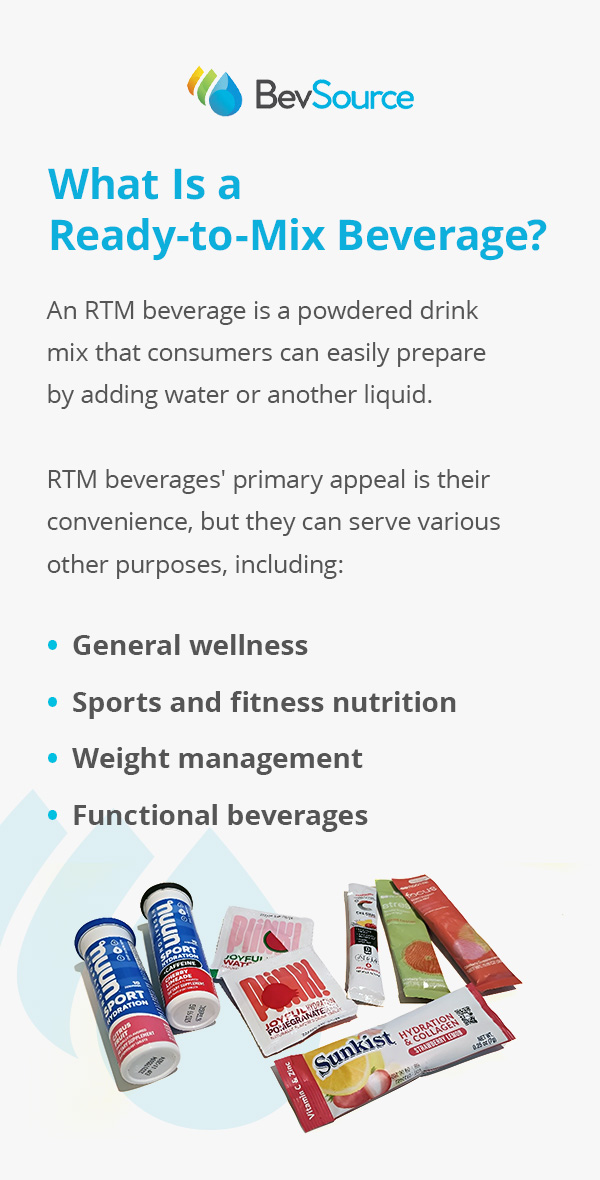
An RTM beverage is a powdered drink mix that consumers can easily prepare by adding water or another liquid. RTMs come in a wide range of options — including protein powders, nutritional supplements and flavored drink mixes — and cater to different consumer preferences and needs.
RTM beverages' primary appeal is their convenience, but they can serve various other purposes, including:
- General wellness: With an increased focus on hydration and wellness, these products offer an easy way to enhance plain water and encourage more frequent consumption of fluids. Some powdered drinks are formulated with electrolytes and other ingredients that can promote faster rehydration, particularly after exercise or sweating. Sunkist Hydration & Collagen Stick Packets are also driving the demand for hydration benefits in powdered drinks. Fortified drink mixes help improve the nutritional and health benefits of beverages by adding vitamins, minerals and other beneficial ingredients. Nutritional supplement RTM drinks often contain a healthy balance of fat, carbohydrates and protein to improve wellness.
- Sports and fitness nutrition: Sports and electrolyte-enhanced powdered drink mixes help meet fitness nutritional needs. For example, powdered fruit juice mixes like Gatorade Thirst Quencher Powder contain carbohydrates and electrolytes to replenish those lost as a result of sweating. Transparent Labs BULK has been tested as a beneficial pre-workout RTM beverage with clinically dosed nootropics and caffeine to provide sustained energy without crashes. Post-workout powders also aid in sports nutrition by replenishing energy stores, reducing delayed onset muscle soreness (DOMS) and supporting overall recovery.
- Weight management: Meal replacement shakes and appetite control formulations may be beneficial for individuals aiming to lose weight. For instance, these beverages may help release fullness hormones like PYY and GLP-1 to decrease appetite and hunger. High-protein powdered beverages may also aid in weight management by preventing regaining weight due to their effect on the metabolism, appetite and muscles.
- Functional beverages: RTM beverages offer functional benefits for several types of consumers, from athletes to menstruating women and everyone in between, to help them achieve particular goals. For example, some powdered beverages contain caffeine and can act as a quick pick-me-up. Others contain nootropics — ingredients that can improve cognitive function — or clinically backed ingredients. Some powdered juice drinks may also include a mix of vitamins and nutrients to promote gut and joint health or support the immune system.
The Rise of Powdered Beverages
In today's fast-paced world, consumers are looking for health and wellness products that are both effective and convenient. Traditional liquid beverages, while popular, come with limitations such as shelf life, storage requirements and the inconvenience of carrying bulky containers. RTM beverages address these issues by offering a lightweight, shelf-stable alternative that can be easily mixed with water at the time of consumption. This shift toward RTMs is driven by a growing demand for products that fit seamlessly into busy lifestyles without compromising on health benefits.
A study by Organic and Conventional Nature estimates that the powdered beverage market is valued at $5.38 billion in 2024 and is projected to reach $11.46 billion by 2034. This is an impressive compound annual growth rate (CAGR) of 11.30%. In the United States, the expected CAGR for the same period is 3.2%.
Trends Driving Consumer Adoption of RTM Beverages
The Organic and Conventional Nature report shows that the increased demand for these instant beverages is largely due to a desire for more convenient products that require less preparation time and offer a longer shelf life. The report also shows that powdered beverages typically stand out to consumers who are health-conscious and looking for low-calorie, low-sugar options. The demand for functional food and beverages is also expected to influence sales.
Here are some trends driving the adoption of RTM beverages:
- Convenience and portability: RTM drinks are easy to store, transport and prepare on the go, making them popular among athletes, fitness enthusiasts and health-conscious consumers. They require minimal preparation — just add water — which makes them attractive to busy individuals looking for quick hydration or nutrition. Stick packs and tablets, in particular, fit easily in a bag or pocket, allowing for quick and convenient access to a flavored drink.
- Customization and portion control: Stick packs and tablets are premeasured for single servings, which helps with portion control and reduces the risk of overconsumption. Consumers have the ability to adjust taste and flavor intensity by controlling the amount of powder and liquid used, permitting a personalized beverage experience.
- Health and wellness: These products enhance plain water and encourage better hydration. Modern powdered beverages also increasingly emphasize natural and organic ingredients while avoiding artificial flavors, colors and preservatives that were common in traditional powdered drinks like Kool-Aid and Tang. They are formulated with reduced sugar or use alternative sweeteners like stevia or monk fruit to respond to the increasing demand for healthier, lower-calorie options. Many RTM beverages are also formulated to provide specific nutritional benefits, incorporating functional ingredients such as vitamins, minerals, electrolytes, probiotics and adaptogens to cater to the health-conscious consumer.
- Targeted benefits: Powdered beverages that offer specific health benefits are also a convenient functional beverage option. For example, Vital Proteins and some Sunkist stick packs include collagen or other key minerals and vitamins for skin health. Stick packs from Som Sleep and Ancient Nutrition include science-backed ingredients for improved sleep.
- Value: These formats are generally more cost-effective per serving compared to premixed or ready-to-drink (RTD) options.
- Eco-friendly: Compared to bottled beverages, stick packs and tablets generate less plastic waste, aligning with the growing consumer demand for environmentally friendly products.
Challenges in Formulating and Manufacturing Powdered Beverages
While demand for RTM beverages is growing, consider these potential industry challenges and solutions:
- Solubility is a critical factor in the manufacturing of RTM (Ready-to-Mix) beverages, and it can present challenges. As Samot explains, “Certain ingredients may be not mix well in water and have poor solubility. Our flavor scientists can add ingredients to suspend them in water or we can process them. Dry mix powders often have to be conditioned with emulsifiers or flow agents, or mechanically instantized by agglomeration or granulation. The goal of improving solubility is ultimately to enhance customer experience.”
- New or trendy ingredients: New or trendy ingredients may be difficult to source, especially without providing a demand forecast for suppliers. According to Samot, "If you're a startup company and you can't provide a forecast for a vendor on how they think the product is going to sell, then you may be limited in what you can do with formulation."
- Volatile costs: Per Samot, the volatility in the pricing of key ingredients like proteins and dairy-derived products can also impact the formulation process. If prices fluctuate after a product launch, it becomes challenging to decide whether to keep the original ingredient or source an alternative. It is crucial for brands to work with reliable manufacturers that maintain close relationships with their vendors. This allows the manufacturer to secure stable pricing through blanket orders and receive timely alerts when a reformulation might be necessary.
- Flavor development: The subjective nature of taste means that what appeals to one consumer may not to another. Formulators must balance flavor, mouthfeel and nutritional content to create products that are both palatable and beneficial.
- Particle size differentiation: Natural products, in particular, have different particle sizes, which can complicate manufacturing. It's crucial to run a pilot batch and test to ensure even distribution of the ingredients, such as vitamins and minerals, that you're making a label claim for. It's equally important in the pilot phase to make sure that you've blended the product long enough and followed appropriate blending processes in order to achieve a homogenous product. "VitaQuest has developed a level of expertise in this area, "Samot states. She says, "While there are new ingredients launching all the time, most of the ingredients are your mainstays, such as vitamins and minerals or standardized botanical extracts, so we have blending procedures in place and have established a precedent for how to achieve a robust blend."
Recent Innovations in the RTM Market
Despite the challenges, the RTM industry is brimming with innovations aimed at enhancing the consumer experience through flavors, textures and delivery systems. One notable trend VitaQuest noted is the development of products that offer a sensory experience, such as effervescent powders and tablets that have carbonation and can fizz. "Flavor innovation is another area where brands are differentiating themselves, for example, with cocktail flavors or nostalgic flavors from childhood," says Samot.
Multifunctional formulations are also gaining traction. Samot says these products address multiple health concerns in a single serving, catering to the growing demand for comprehensive wellness solutions. She gives the example of an RTM that might combine vitamins, minerals and herbal extracts to support immunity, energy levels and mental clarity.
The use of clinically backed ingredients is another key innovation. As consumers become more educated and discerning, they seek out products with proven efficacy. Formulators are increasingly incorporating ingredients supported by clinical research to meet this demand, enhancing both the credibility and effectiveness of RTM beverages. "Consumers are looking for products that not only taste good but also have proven health benefits," notes Samot, highlighting the growing importance of clinical validation in product development.
Future Directions and Trends
The future of powdered drinks looks promising, with several emerging trends set to shape the industry.
One significant area of growth is supplements designed to support individuals on weight loss or GLP-1 medications. These products aim to alleviate side effects such as nausea and gastrointestinal discomfort, providing targeted nutritional support.
Other brands are offering women's health solutions. Mixhers is a rising brand offering powdered beverage products like Hertime, which is designed to address symptoms related to PMS (premenstrual syndrome), and Herthrive for daily menopause and hormone balance support.
Sustainability is another big trend. Samot notes that VitaQuest is "seeing a lot of customers starting to offer refillable options. They'll send in bags or refillable sticks that you can put back into the original packaging that we're already doing. That's been a huge space for us."
Looking ahead, the industry is poised for further innovation, with advancements in ingredient technology, flavor development and sustainability. The next wave of RTM supplements will likely offer even greater health benefits and convenience, solidifying their place in the market as a viable alternative to liquid beverages.
The Benefits of Powdered Drinks for Beverage Brands
Powdered beverages, especially stick packs and tablets, present several advantages for beverage brands:
1. Meeting Market Trends
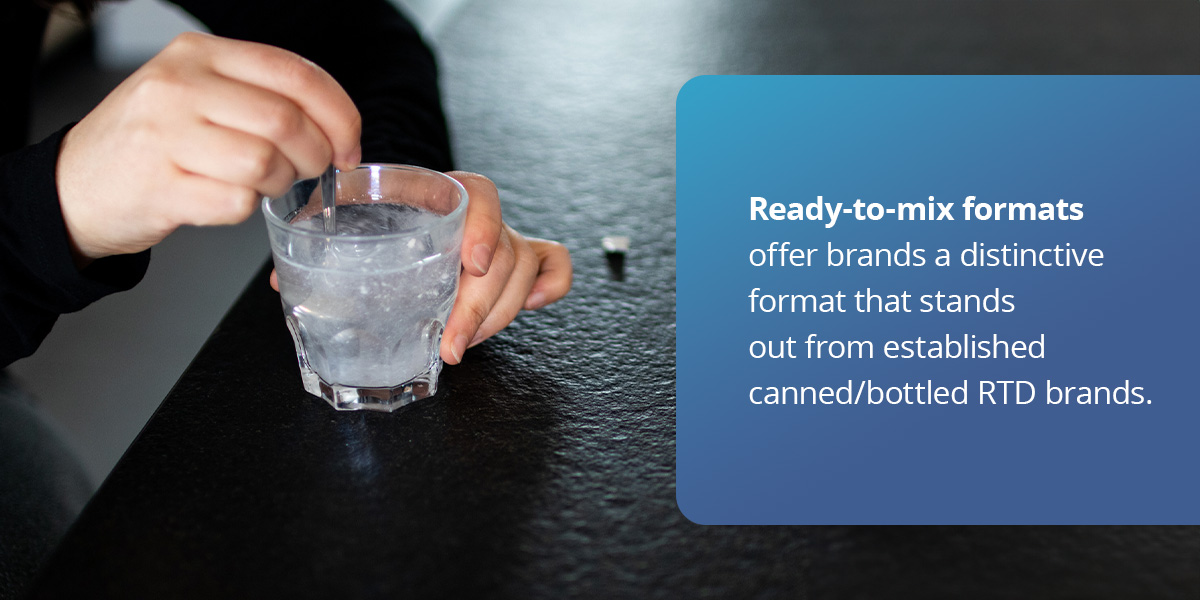
The rise in health-conscious consumer behavior benefits brands that offer powdered beverages, which can be fortified with vitamins, minerals and other beneficial ingredients. With a focus on hydration and functional benefits like energy boosts, immune support or relaxation, brands can cater to specific consumer needs and trends.
2. Reaching New Consumers
Powdered drinks offer valuable opportunities to reach new consumers. You can test new flavors, formulate functional drink alternatives and experiment with natural ingredients that appeal to health-conscious individuals. The format allows for innovative product development, from unique flavors to functional additives, enabling brands to stand out in a competitive market.
3. Low Barriers to Entry
According to Samot, there are very low minimum order quantities on stick packs, for instance, making it easier for startup brands to enter the market or for existing brands as a line extension for their RTD products.
4. Differentiation
The ready-to-drink market is crowded. Ready-to-mix formats offer brands a distinctive format that stands out from established canned/bottled RTD brands. There are many ways to package powdered beverages, including stick packs, tablets and tubs.
Stick packs and tablets are compact and portable, making them convenient to carry around on the go. This is suitable for energy drinks, hydrating beverages and sports drinks. Some examples include Plink!, which sells BFY hydration tablets, and Nuun, which offers sports electrolyte tablets. Tubs are larger and a great option for people who work from home and need a quick and easy way to gain the nutrients they need.
5. Sustainability
RTM beverages meet consumer demand for sustainable products. Consumers are increasingly aware of the environmental impact of single-use packaging. The lighter weight and compact nature of RTM products means reduced fuel consumption and emissions during transportation than their liquid counterparts, contributing to a smaller carbon footprint. Producing powdered beverages also uses far less water.
6. Longer Shelf Life
Powders and tablets have a longer shelf life compared to liquid beverages. This reduces the risk of spoilage and loss, allowing brands to manage inventory more effectively. The lack of water content also inhibits microbial growth, which means there is less need for preservatives, appealing to health-conscious consumers looking for cleaner labels.
7. Cost-Effective
These formats are often more cost-effective in terms of production. Producing powdered beverages is generally less expensive than liquid beverages. The manufacturing process for powders is often simpler and requires fewer resources. The packaging for powders and tablets is generally cheaper and uses less material, making them an economical option as well. They are also less expensive to ship and store due to their lighter weight and smaller footprint compared to liquid beverages.
Developing a Winning Powdered Beverage
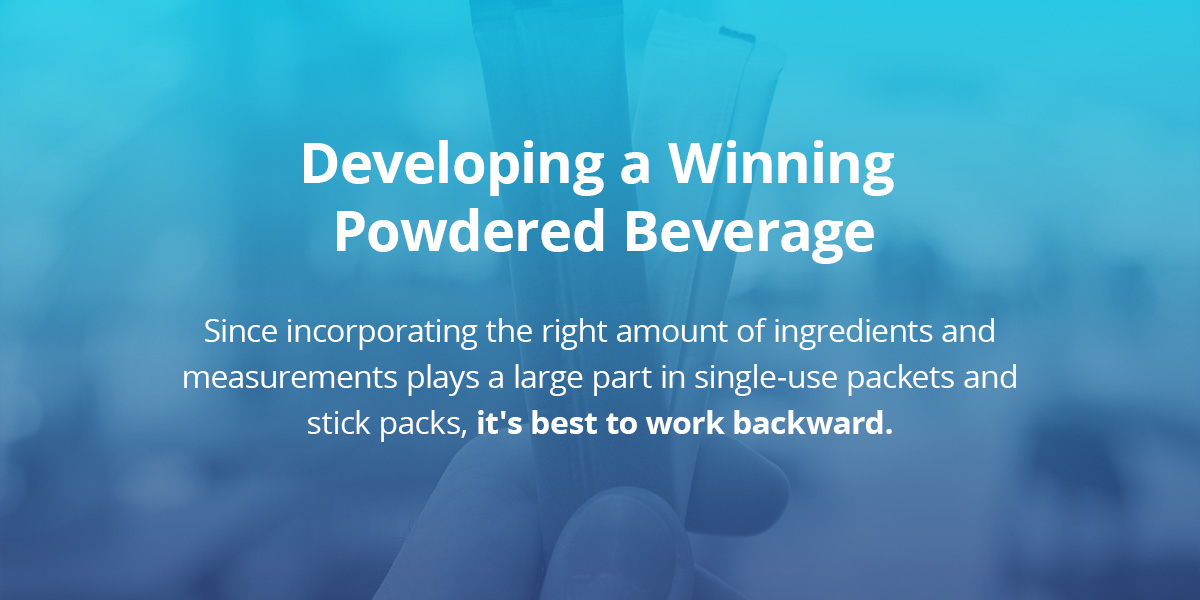
Since incorporating the right amount of ingredients and measurements plays a large part in single-use packets and stick packs, it's best to work backward. Start by establishing your end format. For example, would you like to offer your powdered beverage in a stick pack, tablet or tub? You can then establish your desired claim and label, such as whether it will be gluten-free, organic or non-GMO. After you have a solid understanding of these aspects and the product's size, you can formulate the beverage.
Launch Your RTM Beverage With a Beverage Development Expert
Working with an experienced company from the beginning is advantageous. As Samot explains, "We do a lot of product development work upfront, so we have a library of thousands of ingredients and flavors. We also have a flavor scientist on staff that can match flavors. We push our customers to innovate, to think beyond 'chocolate.' Do they want a brownie chocolate, a salted kind of chocolate or something that tastes more like a Cadbury chocolate? And once you customize your flavor system, it really builds brand loyalty because customers will come back to things that they really enjoy tasting and drinking."
Samot also notes that VitaQuest's relationship with vendors is crucial. "Vendors approach us first when they have a new ingredient or when a new clinical trial is published. They trust us because of our broad customer base and our commitment to formulating products that respect the integrity and research behind each ingredient. This close partnership ensures that we stay at the forefront of innovation and provide our customers with cutting-edge, clinically supported products."
Develop Your Own Beverage With BevSource!
From the demand for more exotic flavors to the need for instant wellness beverage solutions, trends in the powdered beverage market show that there are various opportunities for entrepreneurs who want to develop their own powdered drink mix.
If you're looking to develop a unique powdered beverage in one efficient product development process, BevSource is your one-stop, single-source beverage professional to help you optimize your beverage project, from sourcing ingredients to connecting you with beverage formulators and packaging experts.
Working with us gives you exclusive access to a range of quality suppliers and ingredients and over 70 seasoned beverage professionals with experience and key market insights to help you make informed decisions. It also offers a great way to improve your cost savings, optimize your formula correctly and make the right operational decisions early on for a more efficient process.
To get started in your next beverage, whether liquid or powder, contact a specialist at BevSource today.
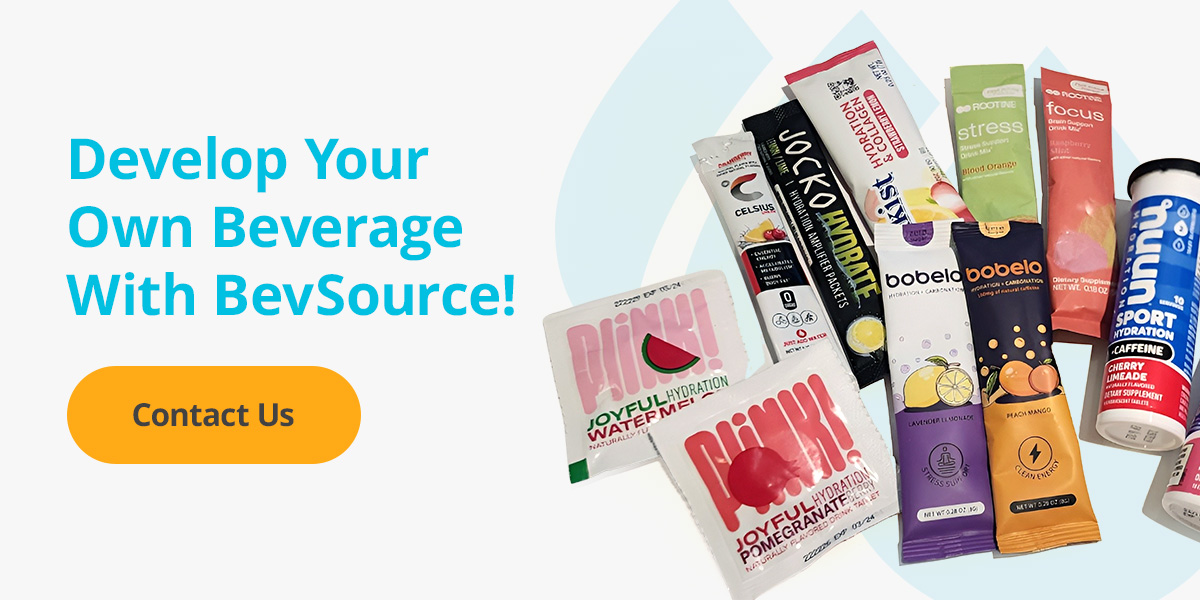
 By
By 